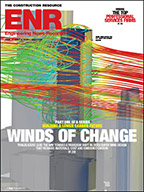Eric Flicker, CFO at Pennoni Associates, says RTB will boost the value of an engineering education even for those who don't pursue a license.
Even so, not all civil engineers favor the change. ASCE membership is believed to be split on the issue, and the American Council of Engineering Companies opposes it. "Advocates of the [master's degree] sell short the training provided to young engineers by experienced professional engineers as compared to training provided by 30 classroom credits," says William Stout, CEO of Gannett Fleming and ACEC vice chairman.
"Today's engineering graduates are better educated than decades ago with the quantum leap in technology," adds Gregs Thomopulos, chair of Stanley Consultants and ACEC chairman-elect.
 |
| STOUT |
Former Kleinfelder CEO Gerald Salontai wants to boost the role of non-classroom experience. "More errors and resultant litigation are derived from licensed engineers that do not have direct experience or were poorly mentored 'on the job,' not from their underlying education," he says.
Christine Fiori, a Virginia Tech University engineering professor, says internships should be made mandatory in any education revision.
With the industry divided on RTB, propelling it forward will be a challenge. An article this year in Prism, the engineering educators' magazine, took note that even academic supporters such as James Duderstadt, former University of Michigan president, and John White, former Georgia Tech engineering dean, don't agree on approaches.
Several industry and academic sources did not return requests for comment or would not comment for attribution due to the issue's sensitivity. "This is a controversial issue for the engineering community as no one seems to agree with each other," says one design firm CEO.
Proponents had hoped for one state board action to adopt the Model Law by this year, but that will not happen. Nebraska introduced legislation in 2008 but has tabled it for more study. "Several member boards have indicated plans to propose an amendment to their practice acts in the next legislative cycle," says Patty Mamola, a Reno, Nev., engineer who in August will become the president of the National Council of Examiners for Engineering and Surveying. She did not identify those state boards
According to ASME's Goldsmith, Vermont, New Hampshire, West Virginia, Maryland, Idaho and Illinois are farthest along in considering a change. "Our team at ASME is prepared to go to these boards and present our case," he says. Russell says ASCE is committed for the long term, saying, "Even if it's called stupid, it's the right thing to do."
Students Speak Out
Students are voicing their opinions, too. "Companies are looking for engineers who can take initiative and function independently," says David Dunn, an electrical and computer-engineering graduate student at Cornell University. "Better engineering degrees can help with both of these."
Adds a Virginia Tech engineering student, "If we're considering ourselves professional engineers, why would we shy away from a cost of getting there? You have to look at it as an investment."
Joseph Plummer, a 2009 Virginia Tech economics graduate who took engineering courses at the BS and MS levels, thinks admission requirements could be lowered to attract more prospects but raised for licensing to ensure the most well-rounded professionals.
He also advocates more intermediary steps before the license, an idea that is similar to lower-paid medical residents, as well as alternative pathways so that students can switch from other majors to engineering.
Overall, Plummer says more outreach is needed. "If we raise the bar without lowering a hook, then we are effectively pushing people away from engineering," he says.






Post a comment to this article
Report Abusive Comment